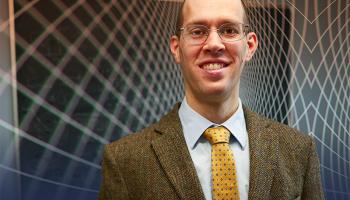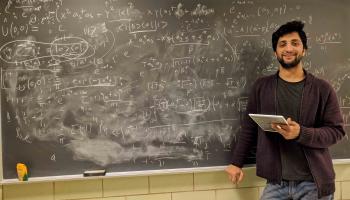NSF Grant to Advance Research in Quantum Computing

University of Virginia physics professor Olivier Pfister is part of a multi-university team recently awarded a $4 million grant from the National Science Foundation to help design the next generation of quantum computers, devices that could one day transform fields ranging from national security to drug discovery.
The project, “Quantum Computing Applications of Photonics,” is one of four efforts funded through the NSF’s National Quantum Virtual Laboratory. The initiative is building a shared national resource for quantum science, giving researchers across the country access to hardware and software that are currently limited to a handful of specialized labs.
Led by the University of New Mexico, the team includes researchers from UVA, New Mexico State University, the University of Maryland, and national labs such as Sandia, Los Alamos and the National Institute of Standards and Technology. UVA’s share of the funding will amount to about $800,000 over two years, with Pfister serving as a co-principal investigator.
Computing at the Speed of Light
Unlike classical computers, which store and process information in binary form, quantum computers exploit the unusual properties of quantum mechanics to process information in ways that are exponentially faster for certain tasks. Pfister and his colleagues are exploring photonic quantum computing, which uses particles of light — photons — as the basic units of information. By developing scalable “architectures” that integrate light sources, detectors and quantum processing units onto chips, the team aims to overcome some of the biggest obstacles facing quantum technology today, first and foremost limited scalability, as well as noise leading to computing errors.
“This grant supports both immediate collaboration and long-term possibilities,” Pfister said. “In the short term, it enables intensive brainstorming on photonic quantum computing architectures, especially in applications like quantum simulation and error correction. Long term, the goal is to actually build photonic quantum computers as part of a much larger implementation phase.”
Christa Acampora, dean of the College and Graduate School of Arts & Sciences, said the award reflects UVA’s leadership in tackling big challenges through cross-disciplinary research.
“One of our highest priorities is amplifying the impact of our research by bringing together faculty across departments and schools to take on questions of global significance,” Acampora said. “Professor Pfister’s collaboration with colleagues in physics and engineering is a perfect example of this, and it positions UVA at the forefront of a technological transformation that will shape our future.”
New Opportunities for Education and Collaboration
The grant also means expanded opportunities for students. UVA recently launched an Applied Physics track within the physics major, including concentrations in quantum information and photonics, and Pfister said the project will provide undergraduates and graduate students with hands-on research experience in technologies that are increasingly in demand.
“There is a worldwide shortage of talent in quantum technologies, and industry demand continues to grow,” he said. “This project helps ensure that UVA students are ready to contribute to the field, whether in academia or industry.”
Pfister and his UVA colleagues — electrical and computer engineering professors Xu Yi, Joe Campbell and Andreas Beling — have been collaborating for years on related research. This fall, they will join faculty from across Grounds and external experts at a symposium on quantum computing organized by the Office of the Vice President for Research. The Oct. 13 event will highlight how quantum technologies are poised to revolutionize multiple fields, with participation from Arts & Sciences, the School of Engineering and Applied Science, the School of Medicine and Jefferson Laboratory.
While large companies are investing heavily in quantum computing, Pfister emphasized that universities remain essential players. “Building a real, working quantum computer is a massive challenge,” he said. “Universities play a crucial role in advancing the basic science that makes progress possible.”
Pfister added that the NSF grant is just the first step toward a much larger effort. Teams selected in the design phase will have the chance to compete for research-center-scale funding to implement their ideas.
“The award is modest compared to the scale of the challenge,” he said. “But it is a gateway. It allows us to prepare for the next level of competition and, ultimately, to contribute to building the first truly practical photonic quantum computers.”







